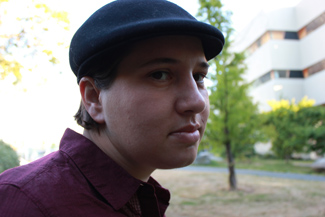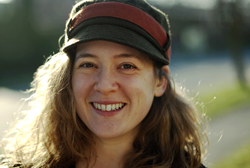There Is A Story:
Andrea Routley
in Conversation with Alex Leslie

Plenitude Magazine founder and Caitlin Press publicist Andrea Routley discusses origins of folktales and historical inspiration with Writers' Trust award-winning author, Alex Leslie. Her creative nonfiction piece, "Yiddish Stories," will appear in Issue #192, Autumn 2015.
What kind of research was involved in writing “Yiddish Stories”? Where did you encounter these stories?
These stories come out of my experiences in my family, stories from my grandmother, as well as my own reflections and explorations of our Jewish history. For a long time I have been drawn to Yiddish folktales, which are traditional stories from the Jewish communities in Eastern Europe. I have been reading Yiddish folktales for years and over time decided to use them to start to write some of our history, which includes the experience of the pogroms, immigration from eastern Ukraine, and the subsequent devastating impact of the Holocaust in the region. It is a complicated history with many gaps and many different perspectives.
Jane Silcott defines creative nonfiction as writing that is “about facts, and the word creative is meant to speak not to the facts, but to the way they’re conveyed.” How does this definition connect with, or contradict, your own?
When you’re writing about your experience within a group of people, whether that’s a family or a community, you are writing about your memories, your memories of how others conveyed memories to you, and your personal sense of the meaning of events and words. All of this is deeply tied to your identity, your values, and the choices of others, which you may or may not know about. You will never know the whole story. There are too many factors and unknowns to talk about these things in terms of “facts.” When there is a strong cultural and spiritual element, the word “fact” becomes even more dubious. Also, it’s important to note that Yiddish folktales were transmitted orally for many generations; they were gathered and transcribed by the YIVO Institute in Vilna as a response to the rise of anti-Semitism in Eastern Europe, which is how they survived the Holocaust. The sense of “facts” comes from the Western tradition that emphasizes written record, stable versions of a shared, dominant narrative, and the authority of one author. The existence of “fact” is a culturally specific idea.
In creative nonfiction, the voice of the author is often very present, but in “Yiddish Stories,” the voice of the author only enters very briefly with lines like “There is a story ...” or “It is said, to this day, she still pays the rent.” Can you speak about why you chose to submerge the authorial voice?
Yiddish folktales often emphasize unknowability, unanswered questions, and irresolvable situations. This voice has been helpful to me in working on this project. It is a way to approach events that is open and curious, rather than coming directly from “I know this,” “I don’t know this,” which is an attitude that pre-determines your story.
You are also an accomplished fiction writer and poet. Are there certain subjects or themes that lend themselves to certain genres for you? What prompts you to write in one genre or the other? What led you to write about these stories in prose, for example?
I think that each piece will let you know at some point what form it wants to take. It’s a matter of paying attention to your writing in the moment and being willing to change. Keep your ear to the ground.
You recently won the Writers’ Trust of Canada’s Dayne Ogilvie Prize, a $4000 award given to an emerging queer writer. The jury noted that you meld “remarkable acuity of vision with a refreshing eagerness for formal experimentation,” as evidenced in your previous books, People Who Disappear and The things I heard about you. Can you tell us about your current project?
They Dayne Ogilvie Prize was an honour to receive. I’m working on a collection of prose poems, Vancouver for Beginners, that is close to completion. Pieces from it have been published in Descant, CV2, The Capilano Review, EVENT, Dreamland and filling station. I’m also working on a collection of short stories called We All Need To Eat—this collection has some similarities to my first book of stories, People Who Disappear, and parts of it have been published in Lemon Hound, Prairie Fire, and The New Quarterly, and a story is forthcoming from The Rusty Toque. Meanwhile, I am working slowly on these Yiddish folktales, or my own version of folktales. This project is the slowest and longest. I am not sure at this point where it is going and what will be necessary for it to come to a close. The important part is the journey.

Andrea Routley
* * * * * * * *









